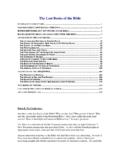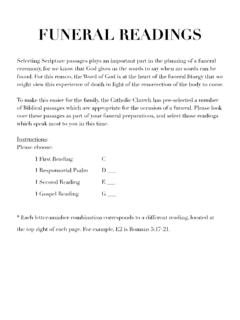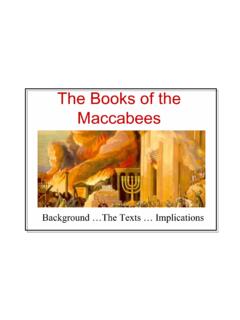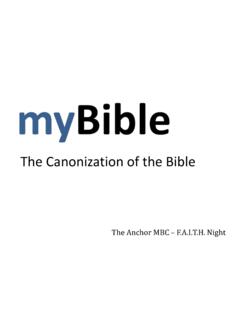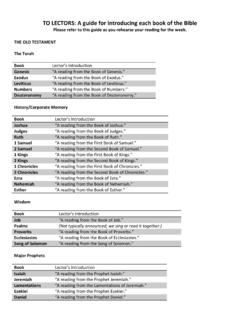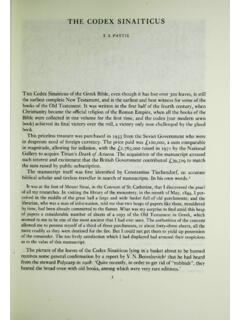Transcription of Thirty Nine Articles of Religion - Anglican Communion
1 Thirty nine Articles of Religion 1. Of Faith in the Holy is but one living and true God, everlasting, without body, parts, or passions; of infinite power, wisdom, andgoodness; the Maker, and Preserver of all things both visible and invisible. And in unity of this Godhead there bethree Persons, of one substance, power, and eternity; the Father, the Son, and the Holy Of the Word or Son of God, which was made very Son, which is the Word of the Father, begotten from everlasting of the Father, the very and eternal God, and ofone substance with the Father, took Man's nature in the womb of the blessed Virgin, of her substance: so that twowhole and perfect Natures, that is to say, the Godhead and Manhood, were joined together in one Person, never to bedivided, whereof is one Christ, very God, and very Man.
2 Who truly suffered, was crucified, dead, and buried, toreconcile his Father to us, and to be a sacrifice, not only for original guilt, but also for actual sins of Of the going down of Christ into Christ died for us, and was buried, so also is it to be believed, that he went down into Of the Resurrection of did truly rise again from death, and took again his body, with flesh, bones, and all things appertaining to theperfection of Man's nature; wherewith he ascended into Heaven, and there sitteth, until he return to judge all Men atthe last Of the Holy Holy Ghost, proceeding from the Father and the Son, is of one substance, majesty, and glory, with the Fatherand the Son, very and eternal Of the Sufficiency of the Holy Scriptures for Scripture containeth all things necessary to salvation.
3 So that whatsoever is not read therein, nor may be provedthereby, is not to be required of any man, that it should be believed as an article of the Faith, or be thought requisiteor necessary to salvation. In the name of the Holy Scripture we do understand those canonical Books of the Old andNew Testament, of whose authority was never any doubt in the the Names and Number of the Canonical Exodus Leviticus Numbers Deuteronomy Joshua Judges Ruth The First book of Samuel The Second Bookof Samuel The First book of Kings The Second book of Kings The First book of Chronicles The Second book ofChronicles The First book of Esdras The Second book of Esdras The book of Esther The book of Job The PsalmsThe Proverbs Ecclesiastes or Preacher Cantica.
4 Or Songs of Solomon Four Prophets the greater Twelve Prophets the other Books (as Hierome saith) the Church doth read for example of life and instruction of manners; but yetdoth it not apply them to establish any doctrine; such are these following:The Third book of Esdras The Fourth book of Esdras The book of Tobias The book of Judith The rest of the Bookof Esther The book of Wisdom Jesus the Son of Sirach Baruch the Prophet The Song of the Three Children TheStory of Susanna Of Bel and the Dragon The Prayer of Manasses The First book of maccabees The Second book ofMaccabeesAll the Books of the New Testament, as they are commonly received, we do receive, and account them Canonical.
5 7. Of the Old Old Testament is not contrary to the New: for both in the Old and New Testament everlasting life is offered toMankind by Christ, who is the only Mediator between God and Man, being both God and Man. Wherefore they arenot to be heard, which feign that the old Fathers did look only for transitory promises. Although the Law given fromGod by Moses, as touching Ceremonies and Rites, do not bind Christian men, nor the Civil precepts thereof ought ofnecessity to be received in any commonwealth; yet notwithstanding, no Christian man whatsoever is free from theobedience of the Commandments which are called Of the Three Creeds, Nicene Creed, Athanasius' Creed, and that which is commonly called the Apostles' Creed, oughtthoroughly to be received and believed: for they may be proved by most certain warrants of Holy Of Original or sin standeth not in the following of Adam, (as the Pelagians do vainly talk.)
6 But it is the fault and corruptionof the Nature of every man, that naturally is engendered of the offspring of Adam; whereby man is very far gonefrom original righteousness, and is of his own nature inclined to evil, so that the flesh lusteth always contrary to theSpirit; and therefore in every person born into this world, it deserveth God's wrath and damnation. And this infectionof nature doth remain, yea in them that are regenerated; whereby the lust of the flesh, called in Greek, ,(which somedo expound the wisdom, some sensuality, some the affection, some the desire, of the flesh), is not subject to the Lawof God.
7 And although there is no condemnation for them that believe and are baptized; yet the Apostle doth confess,that concupiscence and lust hath of itself the nature of Of condition of Man after the fall of Adam is such, that he cannot turn and prepare himself, by his own naturalstrength and good works, to faith; and calling upon God. Wherefore we have no power to do good works pleasantand acceptable to God, without the grace of God by Christ preventing us, that we may have a good will, andworking with us, when we have that good Of the Justification of are accounted righteous before God, only for the merit of our Lord and Saviour Jesus Christ by Faith, and notfor our own works or deservings.
8 Wherefore, that we are justified by Faith only, is a most wholesome Doctrine, andvery full of comfort, as more largely is expressed in the Homily of Justification. 12. Of Good that Good Works, which are the fruits of Faith, and follow after Justification, cannot put away our sins, andendure the severity of God's judgment; yet are they pleasing and acceptable to God in Christ, and do spring outnecessarily of a true and lively Faith insomuch that by them a lively Faith may be as evidently known as a treediscerned by the Of Works before done before the grace of Christ, and the Inspiration of his Spirit, are not pleasant to God, forasmuch as theyspring not of faith in Jesus Christ.
9 Neither do they make men meet to receive grace, or (as the School-authors say)deserve grace of congruity: yea rather, for that they are not done as God hath willed and commanded them to bedone, we doubt not but they have the nature of Of Works of Works besides, over and above, God's Commandments, which they call Works of Supererogation, cannotbe taught without arrogancy and impiety: for by them men do declare, that they do not only render unto God asmuch as they are bound to do, but that they do more for his sake, than of bounden duty is required: whereas Christsaith plainly When ye have done all that are commanded to you, say, We are unprofitable Of Christ alone without in the truth of our nature was made like unto us in all things, sin only except, from which he was clearly void,both in his flesh, and in his spirit.
10 He came to be the Lamb without spot, who, by sacrifice of himself once made,should take away the sins of the world; and sin (as Saint John saith) was not in him. But all we the rest, althoughbaptized and horn again in Christ, yet offend in many things; and if we say we have no sin, we deceive ourselves,and the truth is not in Of Sin after every deadly sin willingly committed after Baptism is sin against the Holy Ghost, and unpardonable. Whereforethe grant of repentance is not to be denied to such as fall into sin after Baptism.


